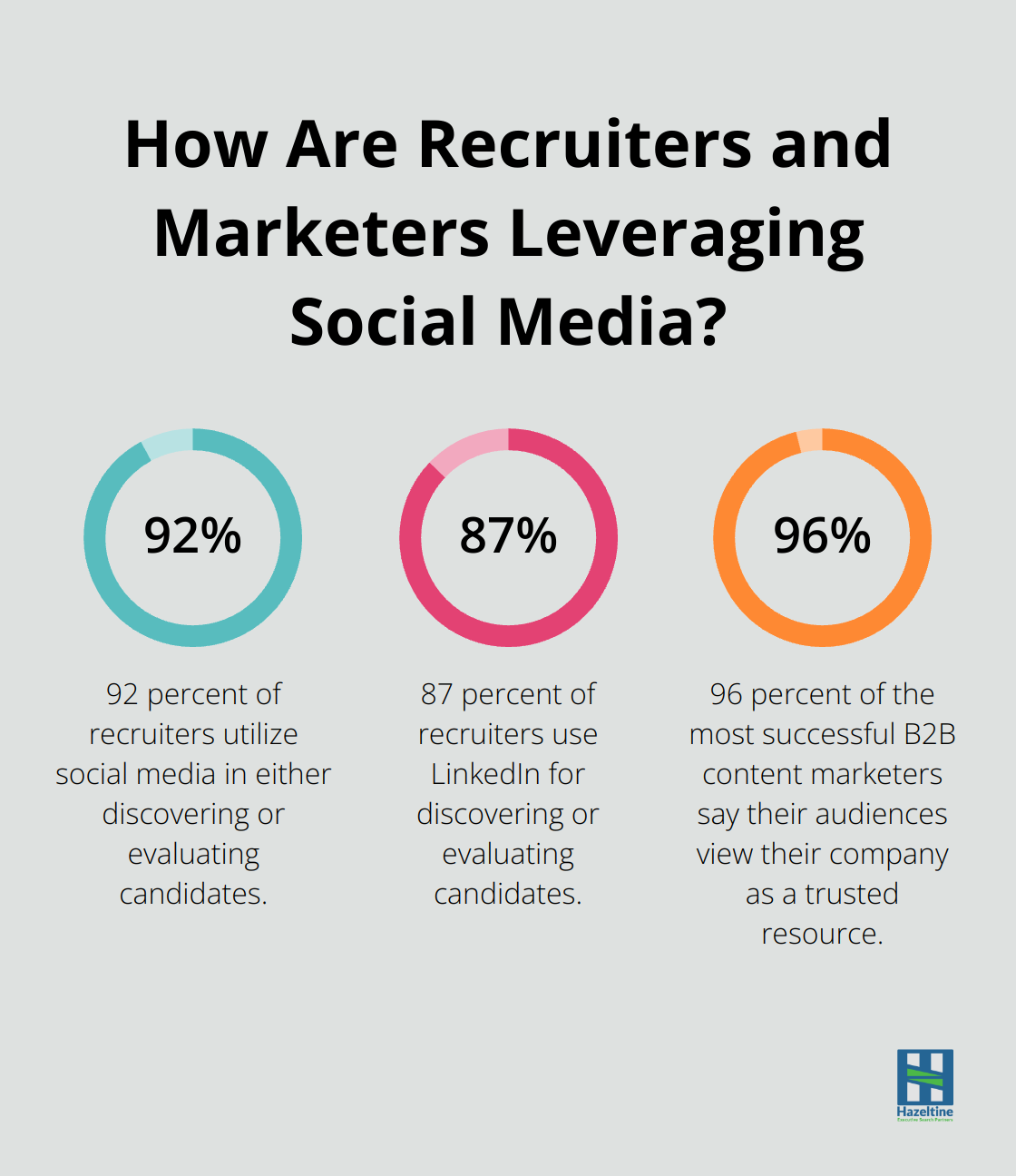Personal branding has become a game-changer in today’s competitive job market. It can open doors to new opportunities and accelerate career growth.
But what role does personal branding play in career development, and how can you build a strong one? This blog will explore the key elements of an effective personal brand and provide actionable strategies to help you stand out in your industry.
What Is Personal Branding?
Defining Personal Branding
Personal branding is the strategic process of creating and managing your professional reputation. It showcases your unique skills, experiences, and values to help you stand out in your industry. At its core, personal branding is how you market yourself to potential employers, clients, and professional connections.
The Power of Personal Branding in Today’s Job Market
In today’s competitive job market, a strong personal brand is no longer optional-it’s essential. With the rise of social media and digital platforms, your online presence often serves as your first impression to potential employers and clients. A well-crafted personal brand can help you:
- Stand out from other candidates
- Attract job opportunities that align with your career goals
- Build credibility and trust within your industry
- Command higher salaries and better positions

A recent CareerBuilder survey revealed that 70% of employers use social networking sites to research job candidates during the hiring process. This statistic underscores the importance of maintaining a professional online presence as part of your personal brand.
How Personal Branding Fuels Career Advancement
A strong personal brand can significantly impact your career trajectory. It acts as a powerful tool for networking, opens doors to new opportunities, and positions you as an expert in your field. Here are some ways personal branding can fuel your career advancement:
- Increased visibility: A well-established personal brand makes you more visible to decision-makers in your industry, potentially leading to new job offers or business opportunities.
- Thought leadership: Consistently sharing valuable insights and expertise can establish you as a thought leader in your field, which can lead to speaking engagements, media appearances, and other career-boosting opportunities.
- Career pivots: A strong personal brand can ease transitions into new roles or industries by highlighting your transferable skills and unique value proposition.
- Networking opportunities: Your personal brand can attract like-minded professionals, mentors, and potential collaborators, expanding your professional network and creating new avenues for growth.
Real-World Impact of Personal Branding
The impact of personal branding on career development is tangible. Many professionals have leveraged their personal brands to secure top executive positions. For example, professionals in the oil and gas industry can use their personal brand to transition into roles in the renewable energy sector. Developing business models with customer centricity at the core and improving energy management practices can play a significant role in such career pivots.
As we move forward, it’s clear that personal branding is a powerful tool for career advancement. But what are the key elements that make up a strong personal brand? Let’s explore this in the next section.
Building Your Personal Brand Foundation
Define Your Unique Value Proposition
Your unique value proposition (UVP) forms the cornerstone of your personal brand. It’s a clear statement that describes the specific value you bring to your industry or potential employers. To develop your UVP, ask yourself:
- What specific skills or experiences set you apart from others in your field?
- What problems can you solve that others can’t?
- What unique perspective do you bring to your work?

For example, if you work in the energy sector, your UVP might focus on your expertise in transitioning traditional oil and gas companies to renewable energy sources. This specific skill set proves increasingly valuable as the industry evolves.
Craft Your Professional Narrative
Your professional narrative ties your experiences, skills, and goals together. It should compel, authenticate, and align with your career objectives. When crafting your narrative:
- Highlight key milestones and achievements in your career
- Explain how your experiences have shaped your professional perspective
- Articulate your vision for your future in your industry
A strong narrative helps potential employers or clients understand not just what you’ve done, but why you’ve done it and where you’re headed.
Establish a Consistent Online Presence
In today’s digital age, your online presence often serves as the first point of contact for potential employers or clients. Consistency across platforms reinforces your personal brand. Focus on:
- LinkedIn: This platform acts as your professional home base. Ensure your profile is complete, up-to-date, and reflects your UVP and narrative.
- Industry-specific platforms: Depending on your field, platforms like GitHub (for tech professionals) or ResearchGate (for academics) can prove valuable.
- Personal website or blog: This gives you control over your online narrative and showcases your expertise.
A study found that 77% of recruiters use LinkedIn for recruitment. This statistic underscores the importance of maintaining a strong presence on this platform.
Expand Your Professional Network
Your network serves as a powerful asset in building and amplifying your personal brand. Active cultivation of professional relationships can lead to new opportunities and enhance your industry reputation. Consider:
- Attending industry conferences and events
- Participating in professional associations
- Engaging with thought leaders in your field on social media
- Seeking mentorship opportunities
Building a strong personal brand takes time and effort, but the payoff in terms of career opportunities and professional growth proves substantial. As you develop these key elements, authenticity remains paramount. Your personal brand should reflect your true professional self, not a fabricated image. Now that we’ve laid the foundation for your personal brand, let’s explore strategies to effectively build and maintain it in the next section.
How to Build and Maintain a Powerful Personal Brand
Maximize Your Social Media Impact
Social media platforms serve as powerful tools for personal brand building and maintenance. LinkedIn, in particular, stands out as essential for professionals. A whopping 92 percent of recruiters utilize social media in either discovering or evaluating candidates, with 87 percent using LinkedIn. To effectively leverage social media:
- Post consistently: Share industry insights, project updates, and professional achievements 2-3 times a week.
- Engage actively: Comment on posts from industry leaders and participate in relevant discussions.
- Showcase expertise: Write articles or create short video content about your area of specialization.
- Optimize profiles: Ensure your bios across platforms consistently reflect your personal brand and unique value proposition (UVP).
Create and Share Valuable Content
Content creation establishes you as a thought leader in your field. 96% of the most successful B2B content marketers say their audiences view their company as a trusted resource. To create impactful content:
- Identify your niche: Focus on topics where you possess unique insights or expertise.
- Select the right format: Choose mediums (e.g., blog posts, podcasts, or videos) that highlight your strengths.
- Maintain consistency: Try to publish content on a regular schedule (even if it’s just once a month).
- Promote your work: Share your creations across your social media platforms and professional network.
Seek Speaking Opportunities
Public speaking significantly boosts your personal brand and industry recognition. To find and leverage speaking opportunities:
- Start small: Offer to present at company meetings or local industry events.
- Pitch yourself: Contact conference organizers with specific topic ideas.
- Create a speaker kit: Develop a professional bio, headshot, and list of speaking topics.
- Record your presentations: Use these recordings to improve and showcase your expertise online.
Continuously Refine Your Brand
Building a personal brand requires ongoing effort and adaptation. Regularly reassess your brand, seek feedback from mentors or colleagues, and adapt as your career evolves and industry trends change. This continuous refinement process ensures your personal brand remains relevant and impactful.
Leverage Professional Networks
Expand your professional network to amplify your personal brand. Active cultivation of professional relationships leads to new opportunities and enhances your industry reputation. Consider:
- Attending industry conferences and events
- Participating in professional associations
- Engaging with thought leaders in your field on social media
- Seeking mentorship opportunities

These strategies (when applied consistently) build a powerful personal brand that opens doors to new opportunities and accelerates career growth.
Final Thoughts
Personal branding plays a pivotal role in career development, opening doors to new opportunities and accelerating professional growth. A strong personal brand sets you apart from other candidates, attracts aligned job opportunities, builds industry credibility, and can command higher salaries. The digital age has made personal branding more important than ever, with employers increasingly using social media to research potential hires.

To build a strong personal brand, define your unique value proposition and craft a compelling professional narrative. Establish a consistent online presence, particularly on LinkedIn, and actively expand your professional network. Create and share valuable content to position yourself as a thought leader in your field, and seek out speaking engagements to boost your visibility and credibility.
At Hazeltine Executive Search, we understand the importance of personal branding in securing top executive positions. Our recruitment process provides candidate insights and ensures alignment with both skill requirements and company culture. The investment you make in your professional image now will pay dividends throughout your career, opening up new opportunities and positioning you for long-term success in your chosen field.








